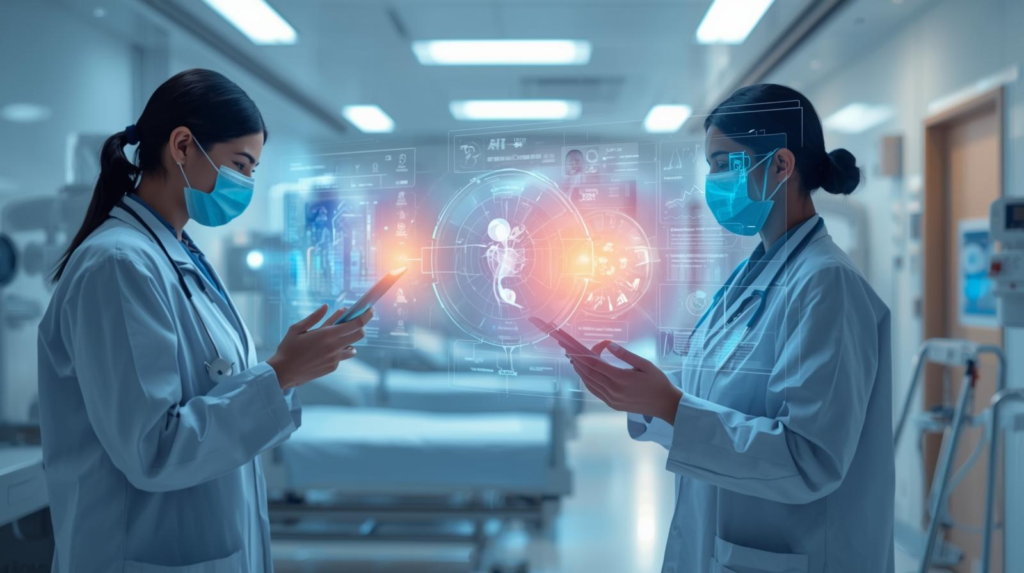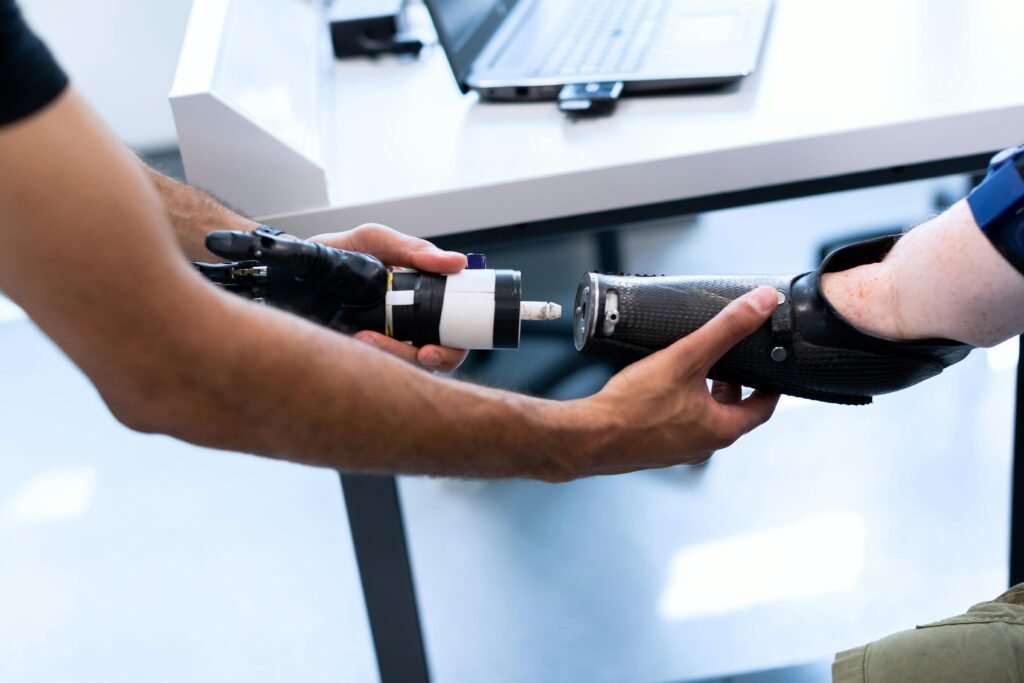
- Introduction – India’s Healthcare Challenges and AI as a Disruptor
- AI in Predictive Diagnosis – Early Detection of Diseases
- AI in Medical Imaging – Faster and Accurate Reports
Introduction – India’s Healthcare Challenges and AI as a Disruptor
India’s healthcare system stands at a unique crossroads. With a population of over 1.4 billion, the demand for quality medical services is enormous, but challenges such as doctor shortages, rising costs, rural inaccessibility, and late-stage disease detection continue to weigh heavily. Traditional systems struggle to meet the needs of millions, particularly in Tier 2 and Tier 3 cities where healthcare infrastructure is underdeveloped. This is where AI in Indian healthcare is emerging as a game-changer. From predictive diagnosis of diseases like cancer and heart conditions to AI telemedicine in India that brings virtual doctors to rural communities, artificial intelligence is helping bridge critical gaps. Moreover, AI solutions are reducing costs, improving efficiency, and delivering affordable treatment with AI for millions of patients.
At AixCircle, we believe the future of healthcare in India with AI lies in democratizing access, cutting delays, and making treatments smarter, faster, and more affordable.
AI in Predictive Diagnosis – Early Detection of Diseases
One of the most significant transformations is happening in predictive diagnosis AI in India. Traditionally, many Indian patients are diagnosed only after diseases have progressed to advanced stages, leading to poor outcomes and high costs. AI-driven diagnostic tools now enable early detection by analyzing vast amounts of medical data, lab results, and genetic patterns.
- Cancer Screening: AI models can scan thousands of images to detect early signs of breast, lung, and oral cancer with greater accuracy than human specialists.
- Cardiac Risk Prediction: AI algorithms analyze ECGs, blood pressure, and family history to predict heart attacks before they occur.
- Diabetes & Chronic Illnesses: AI-enabled wearable devices track sugar levels, activity, and diet, alerting patients about risks in real time.
For a country like India, where lifestyle diseases are rising rapidly, predictive diagnosis AI India can save millions of lives and reduce the financial burden of late-stage treatments.
AI in Medical Imaging – Faster and Accurate Reports
Medical imaging is another area where AI in Indian healthcare is revolutionizing outcomes. Radiology and pathology are highly time-consuming, with a shortage of specialists causing delays in diagnosis.
AI-powered imaging solutions can:
- Analyze X-rays, CT scans, and MRIs within seconds.
- Detect tumors, fractures, or infections with near-perfect precision.
- Assist doctors by flagging abnormalities they might miss due to fatigue or workload.
Startups like Qure.ai and Niramai in India are already using AI to deliver faster imaging results, particularly in breast cancer detection. By minimizing human error and increasing speed, AI in medical imaging ensures that patients get faster treatment decisions.
Telemedicine & Virtual Care – Reaching Rural India
Despite India’s rapid digital transformation, millions in rural regions still lack access to quality healthcare. This is where AI telemedicine India is emerging as a vital solution.
AI-driven platforms are making it possible for rural patients to connect with virtual doctors, get symptom analysis, and receive treatment guidance without traveling to cities.
Key benefits include:
- 24/7 Availability: AI chatbots and virtual assistants answer patient queries round the clock.
- Cost-Effective Consultations: Patients save on travel, accommodation, and consultation costs.
- Language Accessibility: AI tools provide multilingual support, helping bridge the communication gap in regional languages.
The rise of AI-driven rural healthcare outreach is not just improving accessibility but also reducing the rural-urban healthcare divide.
AI in Drug Discovery & Treatment Planning
Drug discovery is one of the most expensive and time-consuming processes in healthcare. Traditionally, it takes years and billions of dollars to bring a new drug to market. AI is changing this by rapidly analyzing chemical structures, biological data, and patient outcomes.
- Faster Development: AI accelerates the discovery of potential drug compounds.
- Personalized Medicine: Algorithms recommend customized treatment plans based on genetic data.
- Clinical Trials Optimization: AI helps identify suitable candidates and predicts trial outcomes more accurately.
Indian pharma companies are beginning to leverage AI in drug discovery and treatment planning, making medicines more affordable and reducing dependency on expensive imports.
Affordable Healthcare with AI – Making Treatment Accessible
One of the most powerful promises of AI in Indian healthcare is cost reduction. By automating repetitive tasks, improving efficiency, and enabling early detection, AI significantly lowers treatment costs.
Examples of affordable treatment with AI in India include:
- AI-powered pathology labs that deliver tests at a fraction of the cost.
- Automated hospital management systems that reduce administrative overhead.
- Virtual consultations that eliminate unnecessary hospital visits.
For millions of low-income families, affordable treatment with AI means access to quality healthcare that was previously out of reach. At AixCircle, we see this as a pivotal shift in India’s healthcare journey.
Case Studies – Indian Hospitals & Startups Using AI
Several Indian startups and hospitals are already leading the adoption of AI in healthcare.
- Qure.ai – Specializes in AI for medical imaging, particularly in TB and stroke detection.
- Niramai – Uses AI-based thermography for early breast cancer screening.
- 1mg & PharmEasy – Integrating AI-driven chatbots for medicine delivery and patient support.
- Apollo Hospitals – Using AI-powered predictive analytics to forecast patient health risks.
- Sigtuple – Employs AI to analyze blood samples, reducing time for lab results.
These real-world examples highlight how the future of healthcare in India with AI is already being built, saving time, lives, and costs.
Challenges – Data Privacy, Affordability, and Regulation
While the promise of AI in Indian healthcare is immense, challenges remain.
- Data Privacy: Patient records must be protected from breaches and misuse.
- Affordability: While AI reduces costs in the long run, initial adoption costs for hospitals remain high.
- Regulation: India needs strong guidelines to govern AI-based medical tools and prevent misdiagnosis.
- Digital Divide: Rural areas still face poor internet access and lack of awareness about AI solutions.
Overcoming these hurdles will require collaboration between government, healthcare providers, and AI startups.
Future Outlook – AI-Driven Healthcare for 1.4 Billion Indians
By 2035, the future of healthcare in India with AI will look drastically different. Predictive diagnosis will be the norm, virtual AI doctors will serve villages, and affordable treatment will reach millions. Hospitals will use AI-driven management systems to reduce waiting times, while patients will access healthcare from their smartphones.
As AI in Indian healthcare matures, it won’t replace doctors but empower them with sharper insights, faster tools, and better decision-making capabilities.
At AixCircle, we believe that AI is not just a technological upgrade—it is the foundation for building an inclusive, accessible, and affordable healthcare system for every Indian.
Conclusion
India’s healthcare sector is undergoing a massive transformation, with AI in Indian healthcare emerging as the driving force. From predictive diagnosis AI India and AI telemedicine India to affordable treatment with AI, artificial intelligence is reshaping the way patients access, receive, and pay for medical services.
The challenges of cost, accessibility, and quality can finally be addressed by AI-driven innovations. The future of healthcare in India with AI is not just about technology—it’s about saving lives, empowering doctors, and ensuring that every citizen, regardless of geography or income, has access to quality healthcare.
At AixCircle, we are committed to exploring, educating, and empowering India with AI-driven solutions that redefine healthcare for generations to come.

